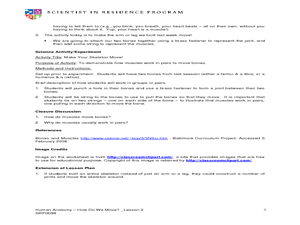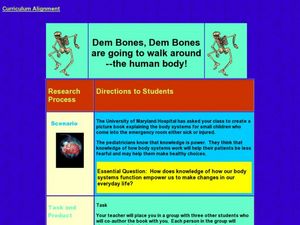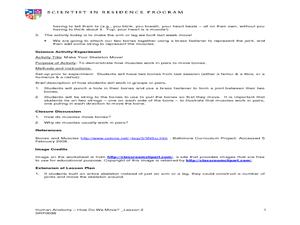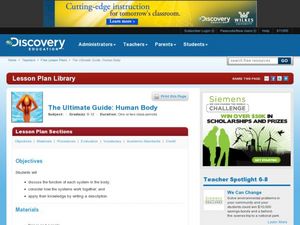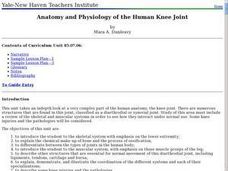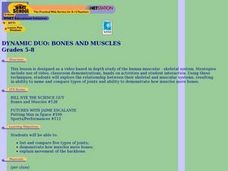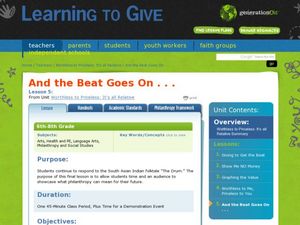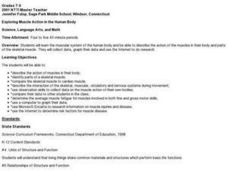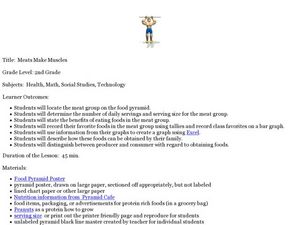Curated OER
Human Anatomy -- How Do We Move?
Students create a model of the digestive system. In this human anatomy instructional activity the students examine features of the digestive system. The students perform an experiment.
Tinybop
The Human Body
Examine the systems of the human body with a bold, charming, and kid-friendly application. This noteworthy tool is certain to get kids interested what goes on inside of them! The eye feature uses the tablet camera to view images and show...
Curated OER
Human Anatomy- How Do We Move?
Learners explore the human anatomy. In this respiratory system lesson, students conduct an experiment to simulate the capacity of human lungs.
Curated OER
Systems of the Human Body
Students inquire about human anatomy by completing a worksheet. In this body systems lesson plan, students discuss the importance of a self-regulating body and how the skeletal, muscular, respiratory and digestive system all take...
Curated OER
Dem Bones, Dem Bones are Going to Walk Around: The Human Body
Students explore human anatomy by creating a science book in class. In this skeletal structure lesson, students identify the different body systems such as muscular, nervous, skeletal, and digestive. Students create a picture book which...
Curated OER
Human Anatomy - How Do We Move?
Fifth graders discover how blood moves around the body. In this circulatory system lesson, 5th graders feel their pulse before and after exercise. Students count their heart rate. Students use the scientific method to record...
Curated OER
The Strength of the Muscular System
Seventh graders investigate the strength of the muscular system. They explore voluntary and involuntary muscle movement and discuss the types of muscles: cardiac or heart, skeletal, and smooth. They visit stations to answer questions...
Curated OER
Organ Systems
Students examine organisms that are composed of tissues, organs, and systems. They dissect a fetal pig and explore the assigned organs systems such as the skeletal, muscular, and circulatory organs. Students identify and explain their...
Curated OER
The Nervous System
Young scholars investigate the nervous system. In this anatomy lesson, students identify and define vocabulary related to the nervous system. Young scholars role play the parts of a nervous system and perform an experiment...
Curated OER
The Ultimate Guide: Human Body
Students study the body systems and their functions. In this human body lesson students research the Internet on body systems and write a description of them.
Curated OER
Anatomy and Physiology of the Human Knee Joint
Students examine human anatomy with a focus on the knee joint. In groups, they research the chemical makeup of human bones and explain the different types of joints found in the body. To end the lesson, they identify the other structures...
Curated OER
Head, Shoulders, Knees and Toes
Students gain a greater comprehension of the anatomy and physiology of the muscular system, the skeletal system and connective tissue by researching joints in the body. They also reflect on the effects of injuries on their joints and...
Curated OER
Exercise and Muscles
Eighth graders identify and label the primary and secondary muscles used to perform an exercise. Students perform an exercise on a weight machine to figure out which muscles are being used. Students illustrate the muscles used by...
Curated OER
Dynamic Duo: Bones and Muscles
Young scholars explore the relationship between their skeletal and muscular systems, resulting in ability to name and compare types of joints and ability to demonstrate how muscles move bones.
Curated OER
Joints Help Us Move
Third graders investigate the three main types of joints in their arms and legs that are in charge of movement. In this human biology lesson, 3rd graders view x-rays online to see how different joints look, participate in exercises...
Curated OER
Systems of the Body
Third graders gather information by questioning, forming hypothesis, collecting and analyzing data, reaching conclusions and evaluating results, and communicating procedures and findings to others. Then they demonstrate an understanding...
Curated OER
And The Beat Goes On...!
Students explore the circulatory system. They observe a dissection of a heart and view the path that blood takes through the heart and the circulatory system. Students identify the structures and functions of the heart. They write a...
Curated OER
Levers in the Body: They Are Not What You Might Think!
Students investigate lever systems in the human body and compare arm anatomy to model. In this human levers activity students graph and analyze their results.
Curated OER
Stop the Bleeding
Learners explore various parts of the heart and blood vessels . They begin with an overview of the components of the cardiovascular system. They see a cross section of an artery and watch how a blood clot develops.
Curated OER
TE Activity: Muscles, Muscles Everywhere
Students study three different muscle types and investigate the affect of space travel on astronauts' muscles. They examine how exercise has a positive affect on muscle both on Earth and in space while looking at engineers' roles in...
Curated OER
The Skeletal System
Students identify bones off a skeleton during quizzes; assemble disarticulated skeletons; bird, frog and rat. They dissect frogs, remove the muscle tissue, and identify of bones.
Curated OER
Exploring Muscle Action in the Human Body
Students collect and graph data and use the internet to research the skeletal muscles.
Curated OER
Bioethics and Humans
Students evaluate "humanity" and conditions associated with it. In this activity lesson students take on issues and construct their own limitations by defining the "human" condition.
Curated OER
Meats Make Muscles
Second graders explore the meat group of the food pyramid. In this nutrition and diet lesson, 2nd graders study the benefits of eating foods in the meat group, collect data regarding their classmates' favorite foods, and create a graph...
